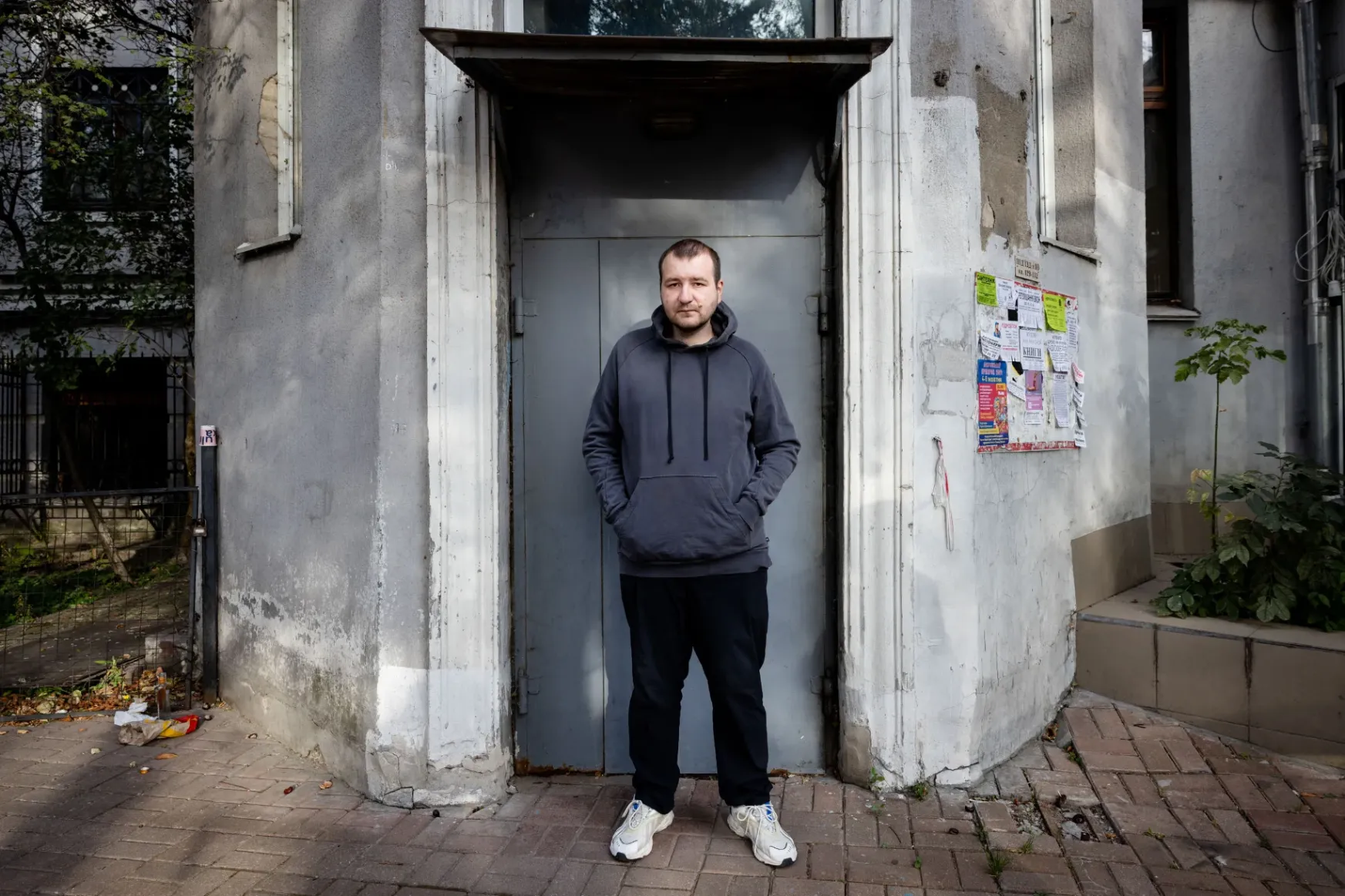
When they put the wire to the prisoner's ears, the Russians call it 'a phone call to Biden'. When they put it in the prisoner's anus – 'a phone call to Zelenskyy'
Volodymyr Fomichov was abducted from his home on January 4, 2016 by agents of the Donetsk „Ministry of State Security”. To this day, it's still unclear who turned him in to the separatist authorities. Twenty-three years old at the time, the Kyiv-based blogger-activist visited his parents in Makiivka, in Donetsk, a few days before the New Year, and on his way there, he even considered the prospect of moving back to his hometown.
He ended up in Russian captivity for just under 2 years.
Fomichov, a university philosophy major at the time, was a regular participant in pro-Ukrainian and pro-European demonstrations in Donetsk in the spring of 2014, and was a member of an education and student rights foundation that the separatists declared extremist. After the Russian-backed breakaway Donetsk People's Republic (DPR) set up its own institutions and government by that July, Fomichov felt it would be too dangerous to stay in Donetsk or Makiivka, so he moved to Kyiv in August to continue his studies. At the same time, he started working for nonprofits fighting corruption and promoting transparency. After a year and a half, he thought he could risk a visit to his parents. „I knew it was dangerous to go home, but I thought everything would be fine,” he says.
After he was taken from his family's home, he was put in the prison of the Ministry of State Security (MGB) and later transferred to a detention center in Donetsk. He was charged with extremism and the illegal possession of weapons – charges to which he was forced to confess after being beaten. The court sentenced him to two and a half years in prison and one year of probation in the DNR. He was held in solitary confinement for the first year and a half, after which he was transferred to a prison in Horlivka, northeast of Donetsk. For a year and a half he had no access to any information from the outside, he could only communicate with his lawyer, provided by the Russians, not with his family and friends. In the last six months, he was allowed to listen to Ukrainian broadcasts on the radio in the prison's community room, but after it was noticed that he liked to spend time with the radio, they stopped turning it on. Nor did he know for a year and a half that he had a chance of being put on the list of civilians and prisoners of war eligible for exchange. „I saw on TV that they were preparing a prisoner exchange and I hoped I would be on the list. I also found out from TV that Putin and Poroshenko had reached an agreement, so I was almost certain that I would be released,” he says of the Russian president and the Ukrainian president prior to Volodymyr Zelenskyy. On December 25, 2017, he was told he would be released via prisoner exchange, and two days later he was set free.
„For the first year and a half I did nothing but sit in my cell,” he says, „and for the last six months in Horlivka I was in forced labor, loading things, weeding, digging pits.” He doesn't say anything else about his time in captivity. However, according to past articles, several months after he was taken away, his parents were given back the clothes he was wearing at the time of the arrest, including a sweater covered with bloodstains. A Ukrainian journalist wrote at the time that Fomichov was being tortured and was clearly in bad shape.
After he was released from prison, the Ukrainian government gave him 100,000 hryvnias (about one million forints) in aid. Fomichov says that state rehabilitation programs were underfunded at the time, and prisoners who had experienced similar trauma largely sought psychological help through specialized foundations or on their own initiative and out of their own pockets. He saw a psychologist for two or three months through a non-profit called Veteran Hub. „Did it help?” we ask. „A little,” he replies in an indecipherable tone.
The civilians and prisoners of war who manage to escape from Russian captivity almost without exception need serious medical and psychological care. Since Russia escalated the war to encompass the entire territory of Ukraine in 2022, the number of Russian captives and those returning home has soared, but many experts say Ukraine is only beginning to understand the lasting impact of the trauma of captivity.
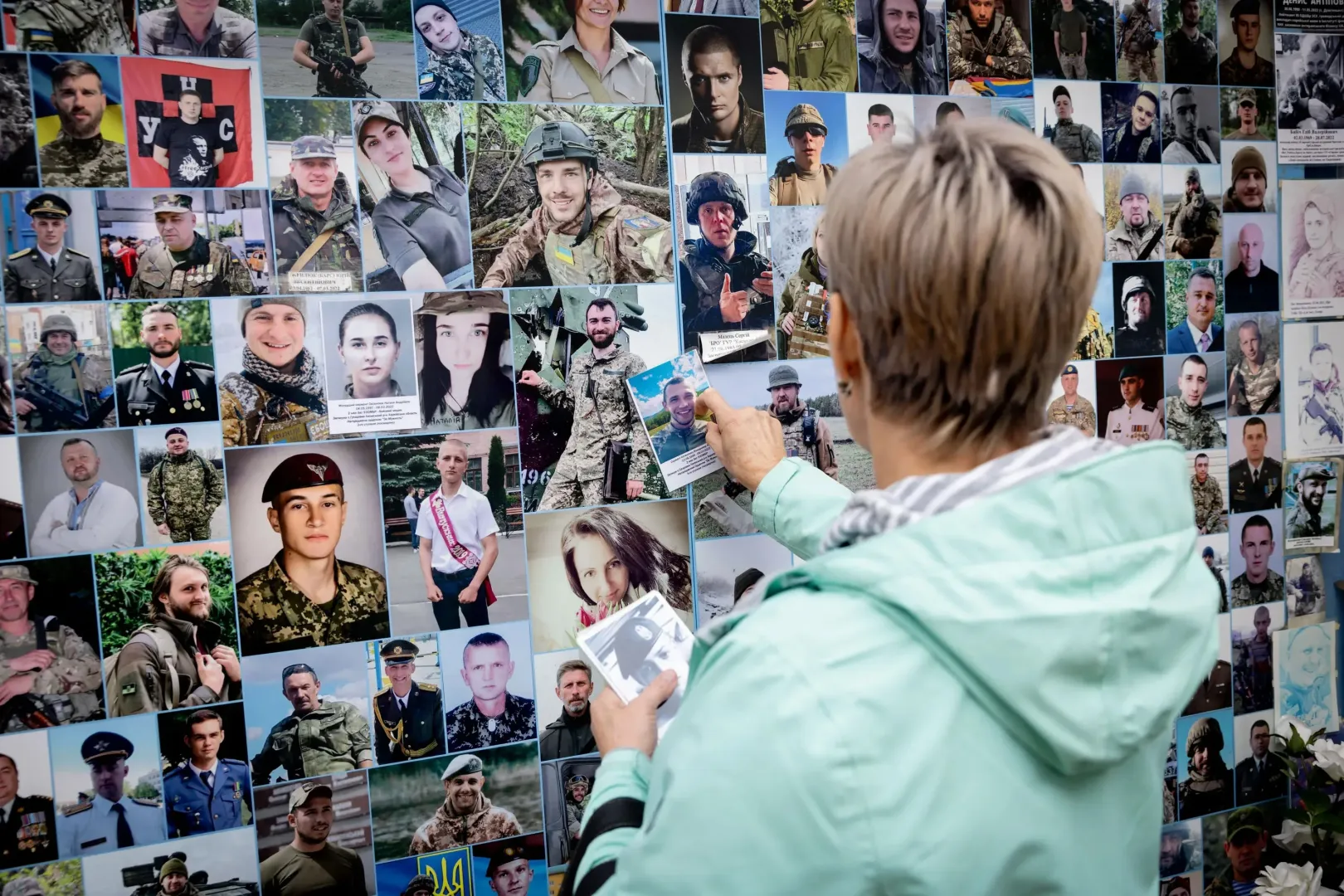
In the second part of our two-part series on the psychological effects of the war in Ukraine, we take a look at the impact of the war on ordinary people and various, particularly vulnerable groups: civilians and soldiers taken prisoner by Russia, children deported from occupied territories to Russian foster care, and internally displaced persons. The first part of this series covered the experiences of soldiers who have been decommissioned or seriously injured in combat, and their families.
I.
„When they put the wire to the prisoner's ears, the Russians call it a phone call to Biden. When they put it in the prisoner's anus – a phone call to Zelenskyy.” Serhiy Movchan, head of the Ukrainian Helsinki Human Rights Union's War Crimes Documentation Unit, turns his laptop towards us, showing a field phone on the screen. The Soviet military phone, nicknamed TAPik, had been taken out of use in the 1980s, but it has re-emerged on the battlefield in the current war: since it is not a high-tech device, it is more resistant to interception, but the Russians also use it very often for electroshocking. Movchan's account is serious not only because of its content, but also because there is no question of it being an embellished story or based on rumor. The lawyer has been working for more than ten years documenting war crimes. The Helsinki Union is one of twenty-four organizations involved in the Tribunal for Putin initiative, which has recorded more than 81,000 Russian war crimes since February 2022. It is partly thanks to their work that there is accessible and verified information on what captured civilians and soldiers are going through.
There are no official figures on the number of Ukrainians in Russian custody. There are some statistics on POWs: in the summer, Vladimir Putin said that there were around 6,400 Ukrainian soldiers being held, but some estimates put the number at over 10,000. According to Ukrainian figures, in the last two years, roughly 3,700 military and civilian prisoners have come home over the course of nearly 60 prisoner exchanges. In the Russian-occupied territories, abductions have become an everyday reality, making it almost impossible to find accurate figures on the number of Ukrainian civilians being held. The exchanges also mostly concern POWs, whose repatriation is in the interests of both sides, says Movchan. The procedure for the exchange of POWs is detailed in the Third Geneva Convention of 1949, but civilians are not mentioned, so from the point of view of international law they are in a gray area. But even more difficult than civilians is the repatriation of soldiers who have been convicted in Russia for one reason or another – the Helsinki Union reports that of the hundreds of convicted soldiers, only 60 have been returned over the last two and a half years.
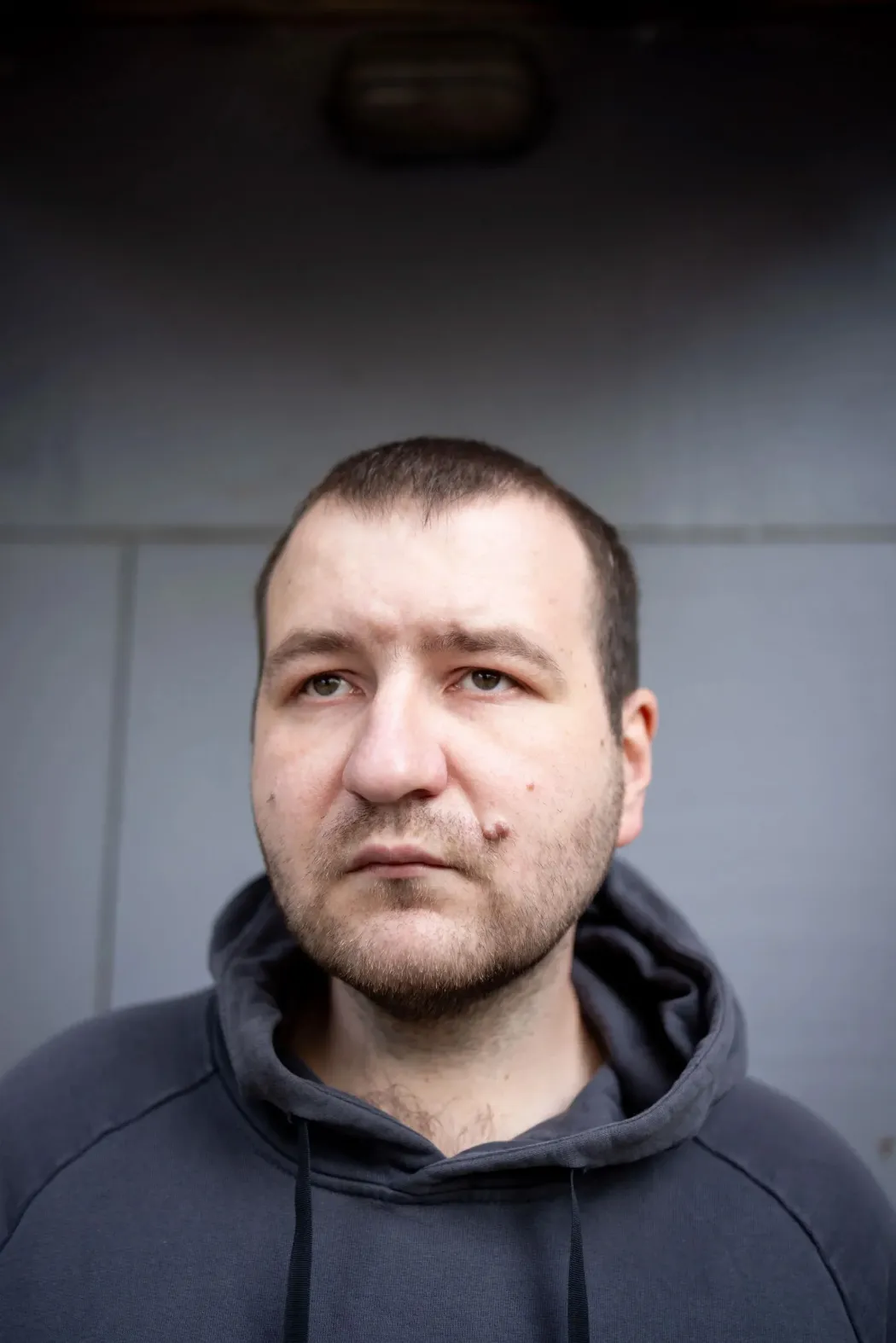
Although the Geneva Convention clearly prohibits torture, Movchak says that reports suggest that the Russians torture Ukrainian prisoners in 97-98% of cases. „The definition of torture is quite broad,” he says. „Some are 'merely' beaten, while other cases are so horrific that the victim is unable to describe what they went through.” According to him, the Russians mostly revert to methods used in Soviet times: electroshocking with field telephones is common practice, but it is also common to put prisoners on metal cots, lay sandbags on them so they cannot get up, and run electricity through the beds or set dogs on them. Ten years ago, people in the occupied territories were mainly confined in basements, garages or official institutions, but today they are more likely to be detained in buildings that can hold large numbers of people. Overcrowding, starvation and inhumane sanitary conditions are just as prevalent as they were ten years ago. Prior to February 2022, prisoners were typically held in the breakaway states, but nowadays they are much more often taken to Russian soil, especially POWs. According to Movchan, because they have more control over the situation there, the extent of torture is probably much greater in Russia than in the occupied Ukrainian territories.
Those who do somehow manage to escape still face many difficulties at home. The lawyer says that a big problem is that it is often difficult to prove that they had been detained, especially in the case of civilians living in occupied territories. They are often whisked away without documentation, and when they are found, they usually lack basic living needs, have no money and are unable to return home. For this reason, many do not even stay in Ukraine, preferring to move to the EU or Georgia if they can. Movchan says that almost without exception, they all need medical care and psychological help.
What is unique in the current war is that the documentation of war crimes began in the midst of the fighting – a practice that has rarely been seen before, the only exception, according to the lawyer, being the Second World War, where the Germans themselves documented their crimes. The documentation work involves interviewing victims and witnesses, following a specific protocol established by international law, and then going to the scene of the crime to take photographs, videos and collect further evidence. These are all later reviewed and authenticated. Their job is made more difficult by the fact that the more time that has passed since the crime, the harder it is to collect evidence. And the visits are not without their dangers: Movcsan and his team often risk their lives, working amid rocket and drone attacks and near minefields.
The material they compile is often used to represent victims in various courts, and to draft reports for domestic courts and the International Criminal Court in The Hague. The lawyer says the example of the two-week-long Russian-Georgian war in 2008 shows that there is hope for victims to receive favorable rulings, but the problem is not with the rulings, but with their implementation. „All we can do is carry out our work and hope that others will carry out theirs.”
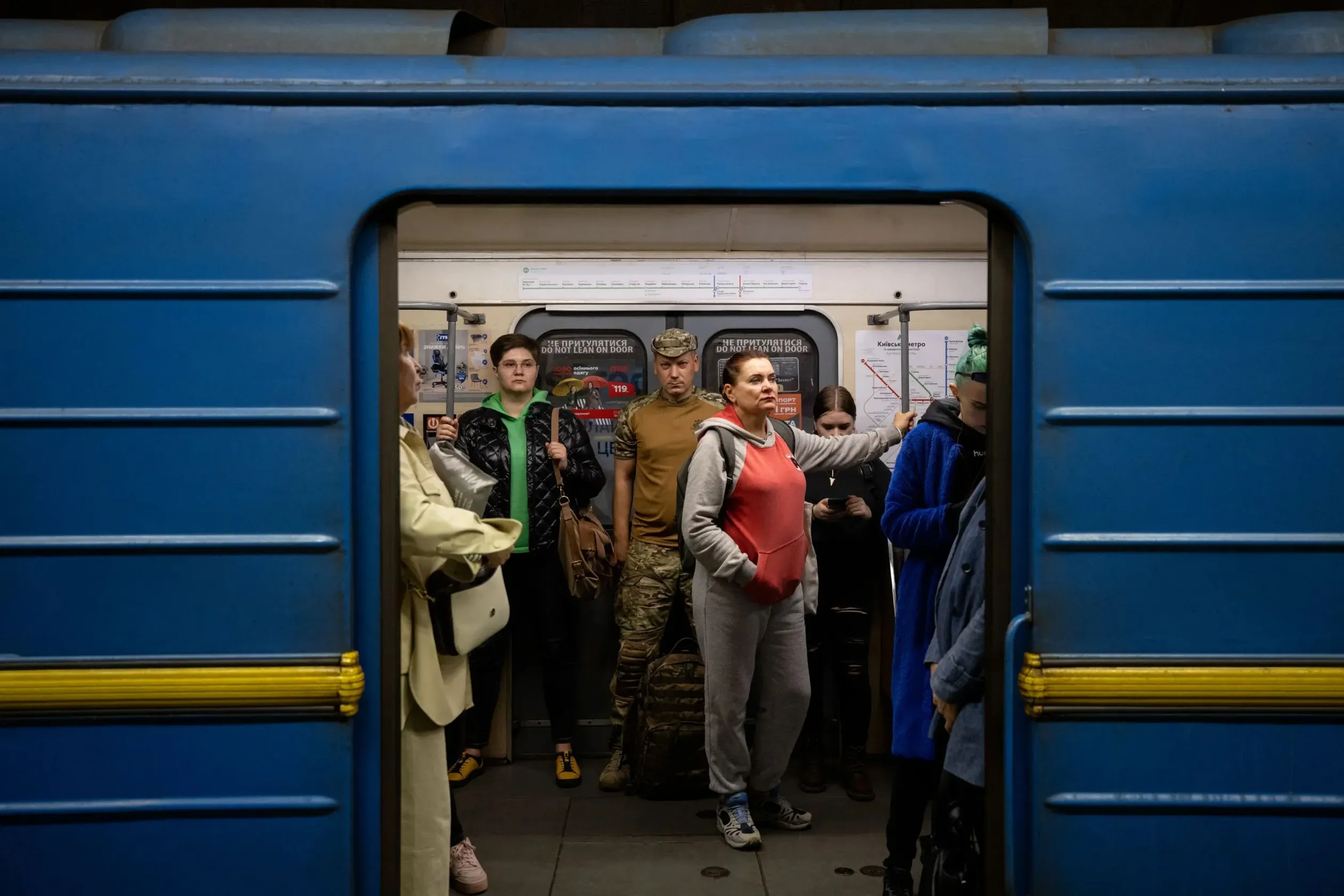
Movchan had been working on documentation for years until 2020, when he decided to take a break during the coronavirus pandemic and started working for the National Anti-Corruption Agency. „The part of the job that took place in Kyiv was not particularly emotionally demanding, even though I had to read about and analyze horrific things. But when you go from the capital to places where war crimes have taken place, it's very different. The hardest part was saying goodbye to the people who live there and coming back to peaceful Kyiv.” In 2020, he concluded that he needed an „emotional hiatus”, but in February 2022 he was called back – initially to a different position, but eventually he ended up coordinating documentation work again. „Few people know how to do this job, someone has to do it,” he says when asked how he copes with the emotional strain of working on documentation. „The break helped, so now I wouldn't do it any differently. If I get worn down, I switch to anti-corruption for a bit, or I hold training sessions. Fieldwork is still dangerous, but I don't mind taking risks because we are helping others through our work. I wouldn't want to be a manager who just sits behind a desk.”
*
„Russian warship, go fuck yourself!” It was one of the first decisive moments of the Russian-Ukrainian war when, on February 24, 2022, Ukrainian border guards on Snake Island in the Black Sea, 30 kilometers off the southern coast of Ukraine, sent this message to the invading Russian warship. The small but strategically important island was occupied by Russian troops in a matter of hours, which Ukraine finally managed to retake in the summer of 2022. According to initial reports, the thirteen border guards on the island were all killed in the fighting, but it soon became clear that they had been captured and shortly afterwards were brought home in an exchange. Some eighty sailors defending the island were also taken prisoner by the Russians, but they were not returned until much later. Among those who were serving there was Vadim, who we meet at the Unbroken rehabilitation center in Lviv. He was admitted here at the end of May after having been held as a POW for two years (the rehabilitation work at Unbroken was covered in detail in our previous article).
„I thought that nobody cared about this island. I didn't expect war at all,” he says. Vadim was placed in a two-person room at Unbroken. He sits with his legs dangling off the bed, an energy drink next to him as he talks, and occasionally takes a drag from his e-cigarette. It's hard to keep track of just how many prisons he's been to in two years, and yet he never once gets confused about where he went, how long he spent there, or what happened. He joined the Ukrainian Navy in 2018 after serving four years as a volunteer border guard. His unit was deployed to Snake Island in late 2021. At 3:30 a.m. on February 24, their commander woke them up to reports of Russian bombers approaching. These eventually turned back, but then at 10 a.m. two Russian warships, the Vasily Bykov and the Moskva (the latter, one of the most important ships in the Russian navy, was sunk two months later), arrived at the island. The Russians waited for the Ukrainians to evacuate the five civilian workers who were present and then offered the sailors and the border guards on the island to give up and go with the civilians on the rescue boat from Odessa. The Ukrainians refused – at which point the much-quoted phrase, which has since even circulated at the European Union Intellectual Property Office, was uttered – whereupon the Russians laid siege to the island and within hours forced its defenders to surrender.
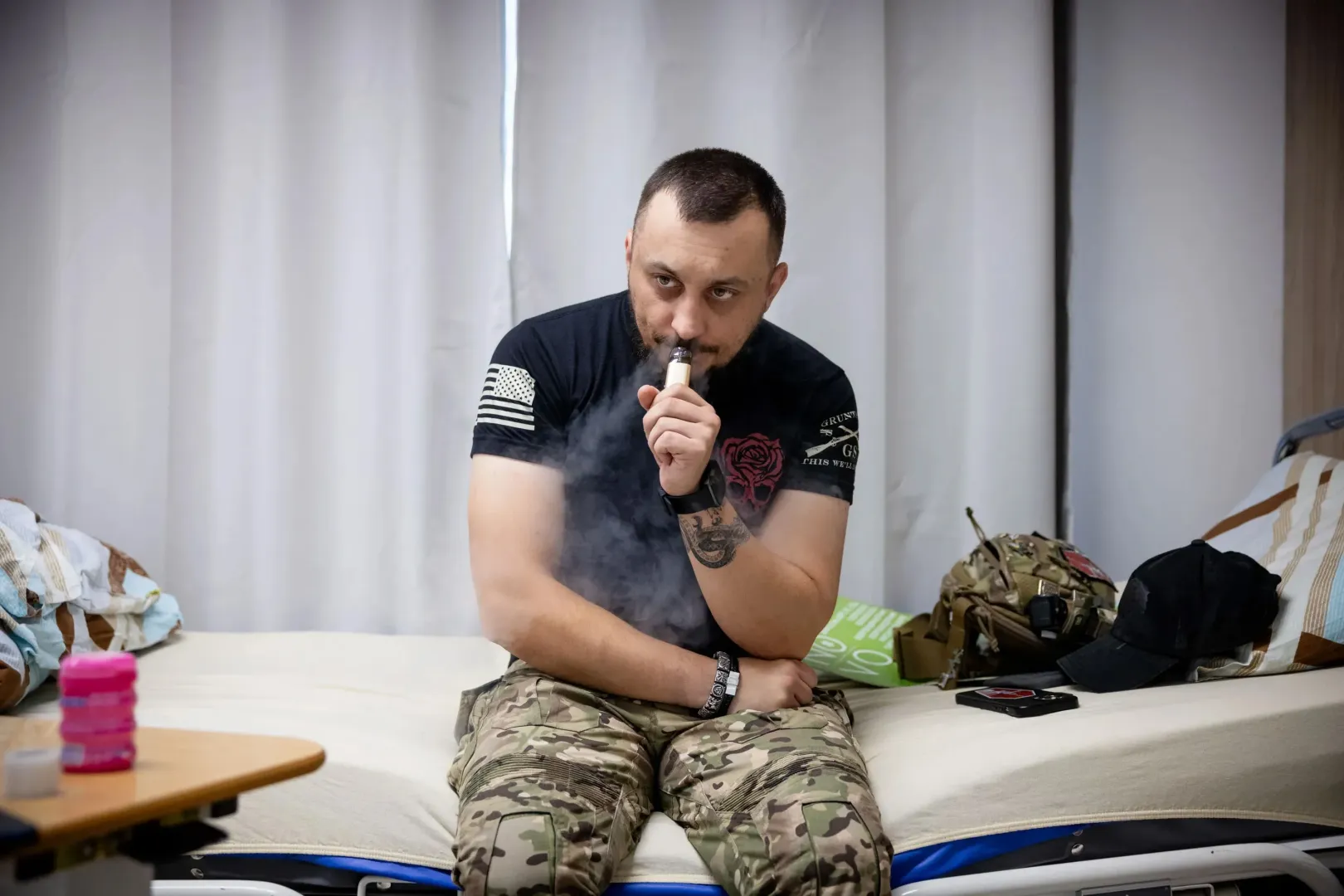
„We put down our weapons, but the Russians took everything else as well: our phones, our wallets, our wristwatches. They made us lie face down on the ground, and we stayed like that until 4 a.m. the next day. I was in a state of complete panic. I didn't know what to expect. Two possible outcomes were going through my mind: either they were going to kill us or take us prisoner. Around nine that morning we were put on a boat and taken to Sevastopol. We spent a day and a half on the ship in the harbor, during which time we never saw any food, though our state of shock would have prevented us from eating anyway. The eighty of us were given one and a half liters of water in total.” A day and a half later, they were taken to a military base – not far from where Vadim had served as a conscript fourteen years earlier – and had their fingerprints and DNA samples taken. He says that the conditions, the food, and even the Russians' attitudes were still „normal” here. After two weeks, the sailors were put on a plane and transported first to Kursk, Russia, and then to Shebekino, a little further south on the Russian-Ukrainian border. It was around this time that Ukraine found out that, contrary to what Russian news reports suggested, the defenders of Snake Island had not been killed after all. The Russians started filming them in Shebekino, but they had to kneel in the snow for two hours beforehand. They were then split into two groups and transferred to a prison in Stary Oskol, 140 kilometers to the northeast. Vadim says that the treatment by the Russians was still more or less okay during the month and a half he spent there. Later they were transferred again, this time to Valuyki, a little further south. „That's when things started to get 'interesting'.”
They began to be interrogated under torture. The Russians wanted to know everything about the defense of Snake Island. Vadim says that at first he was panicked and terrified, but eventually he resigned himself to the idea that he could not expect anything good from then on. They were not fed properly: the nearly 100 people here were given a large bowl of food to share at mealtimes, and had five minutes to eat it all. At the end of September, they were transferred for the umpteenth time, to a prison in Alekseevka, which is also in Belgorod province, where Vadim remained until he was released in a prisoner exchange in May 2024. He doesn't say much about his time there, only that the situation got even worse. „Russian Special Forces soldiers are not human. They are animals. They hate Ukrainians with all their hearts, and their favorite thing to say is that Ukraine doesn't exist.”
After returning home, he was first taken to a military hospital and from there he was transferred to Unbroken in Lviv, where he has been for more than three months. He was in terrible shape at the time of his release: a broken nose, ten missing teeth, stomach problems due to starvation and a knee injury; however, he has improved a lot in the hospital and the rehabilitation center. With the help of a psychologist, he has started to process what happened during his captivity, which he says is helping him a lot. They talk in detail about what he went through and have started to identify the triggers that cause flashbacks (the indelible engraving of the traumatic moment). Vadim says he feels much better now, he receives good care, and he has a mentor who sometimes takes them to concerts, the cinema or to a sushi bar. As for the future, he says he will continue his military service once he has recovered.
One-off traumatic events can happen almost anywhere, but long-term, recurrent trauma can only be experienced in captivity, writes American psychiatrist and world-renowned trauma researcher Judith Herman in her book Trauma and Recovery. The methods by which the captor seeks to control the victim are based on a systematic repetition of psychological trauma and revolve around isolation and the deprivation of autonomy. This does not necessarily require violence: the perpetrator might only use it as a last resort, because the threat of violence may be enough to keep the victim in a state of constant terror. An important means of creating this sense of terror is through the enforcement of fastidious, meaningless rules and inconsistent, unpredictable outbreaks of violence. The main effect of these techniques is to make the victim believe that the perpetrator is all-powerful and that resistance is futile. Herman also writes that the psychological control over the victim is not absolute until they have been forced to violate their own moral principles, to betray their most basic human attachments. From a psychological point of view, this is the most destructive of all coercive techniques, because the victim begins to loathe themself for having given up their principles.
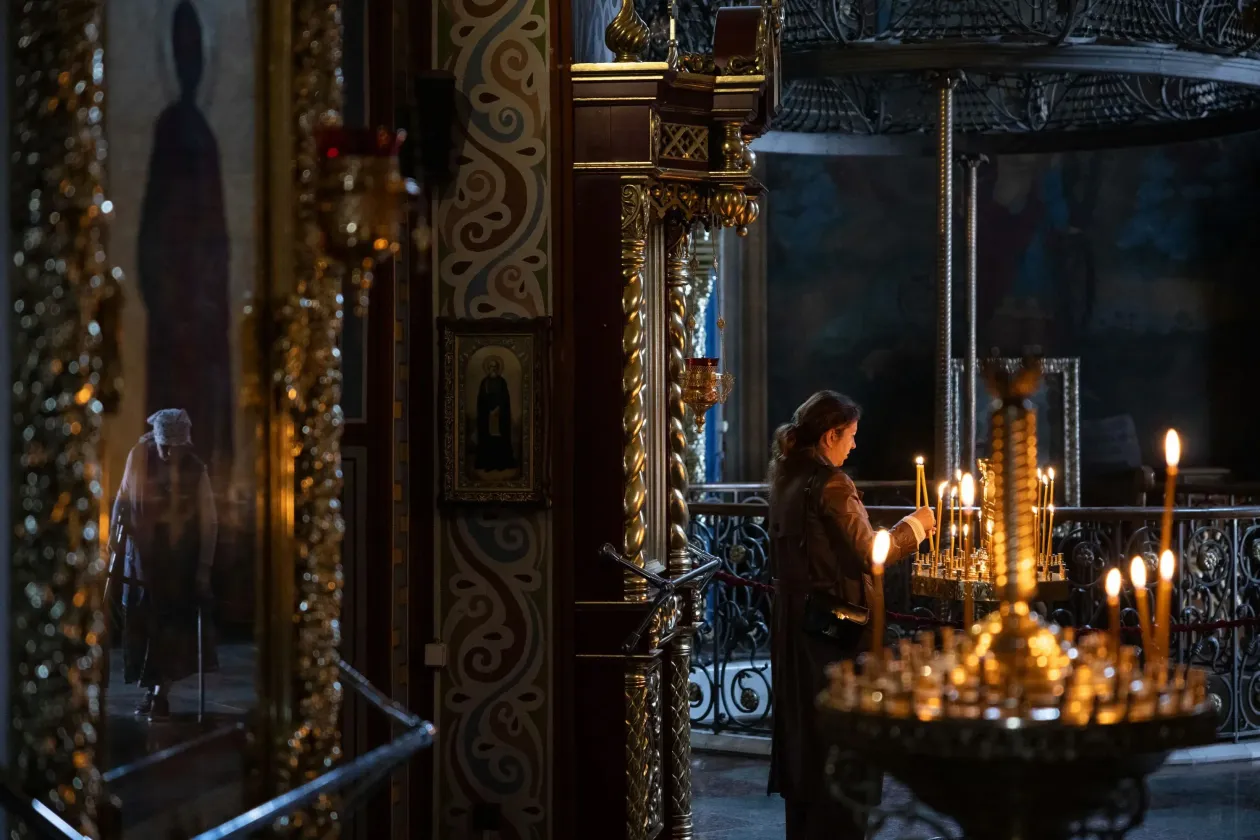
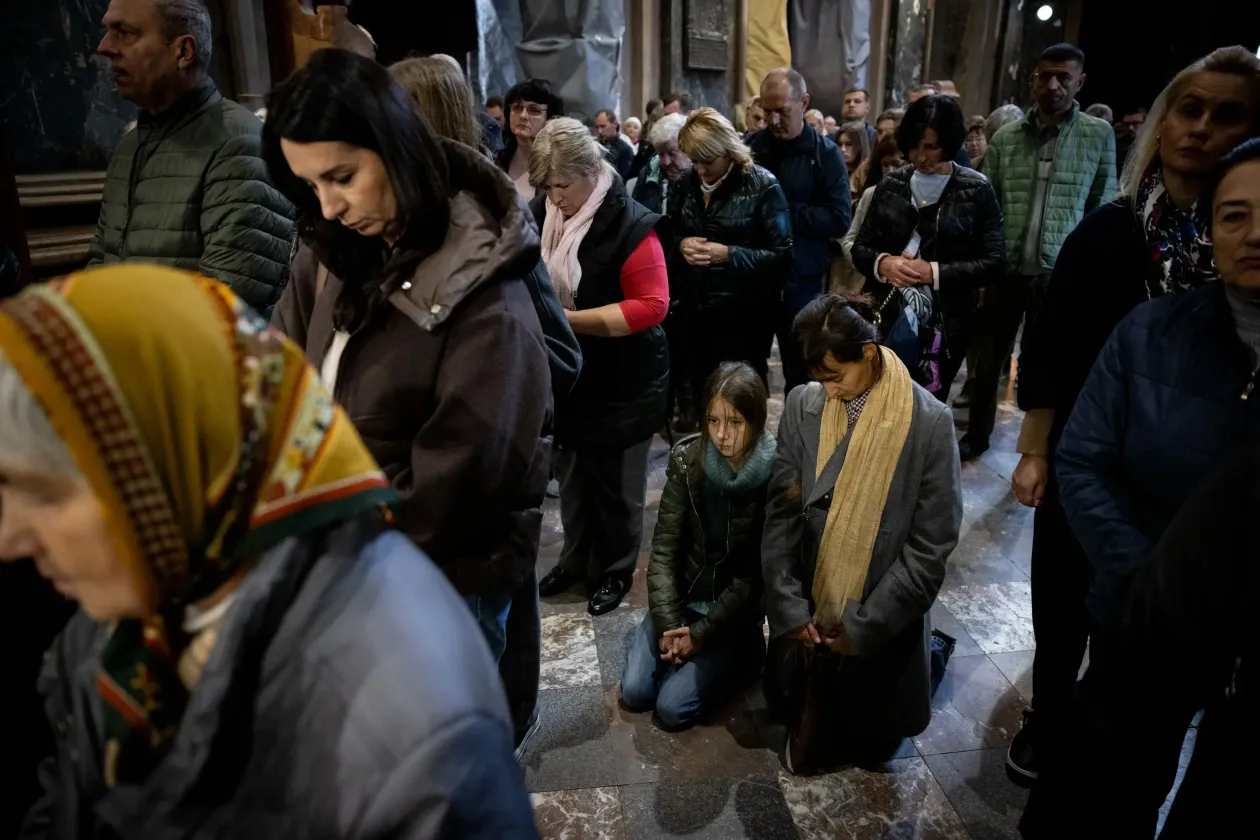
Due to the prolonged repetition of trauma suffered in captivity, the post traumatic stress disorder (PTSD) of its victims is also different. A victim of a one-off, acute traumatic event may feel that they are not themself after the event, whereas a victim of chronic trauma may feel that they have been irrevocably changed, and in extreme cases may even lose their sense of self. They may experience increased hyper-vigilance, constant anxiety, a loss of the sense of physical peace and comfort, and persistent bouts of flashbacks. Following a one-off traumatic event, flashbacks tend to diminish after a few weeks or months, but in the case of chronic trauma, they may persist in a more or less unaltered form for years, even decades, after release from captivity. Of the classic symptoms of PTSD, the one that becomes the most exaggerated is avoidance or constriction. In captivity, all the victim's efforts are directed towards survival, so that psychological constriction becomes an essential form of adaptation, leading to a kind of atrophy of psychological capacities after release.
It is also common for prisoners to develop the ability to consciously restrict or suppress thoughts, especially about the future and the past. To contemplate either is to experience unbearable longing, hope and pain, so that the future is often reduced to mere hours or days. Herman writes that, after release, it is often the case that the victim continues to exist in two realities simultaneously, at different points in time, because in captivity they were gradually compelled to live in a seemingly endless present.
*
One of the most heart-wrenching repercussions of the Russian-Ukrainian war is a particular kind of detention: the deportation of Ukrainian children to Russia. Official statistics estimate that around 20,000 children have been taken by the authorities of the occupied territories to Russia to be placed with Russian 'foster parents', but in reality the number could be much higher. Some of the children are war orphans gathered from the occupied territories, others are taken from foster homes, but there are also some who are abducted on a whim and taken as 'orphans' to Russia. Two years ago, Telex correspondents also met parents who, during the Russian occupation, tried to get their children to a safer place by sending them to summer camps in Russia. But after the unexpectedly successful Ukrainian counter-attack, it became impossible to bring them home. In Ukraine, several NGOs are working to locate and return these abducted children, around a thousand of whom have been returned so far.
Daria Kasyanova, Chairman of the Board of the Ukrainian Child Rights Network and National Program Director of SOS Children's Villages Ukraine, says that the one and a half million children living in the occupied territories are all at risk of deportation. This has been consistently communicated by the Russians to the outside world as humanitarian aid to Ukrainian families. It is not only children in foster homes who are at risk: there are numerous examples of children being picked up after the death of the grandparent who was raising them, but there have also been examples of children who lost their parents in Russian attacks while they survived who are then taken from hospitals to Russia. The expert says that they know of cases where children in the occupied territories secretly buried their grandparents alone, or with the help of neighbors, so the Russian authorities would not find out that there was no one to raise them.
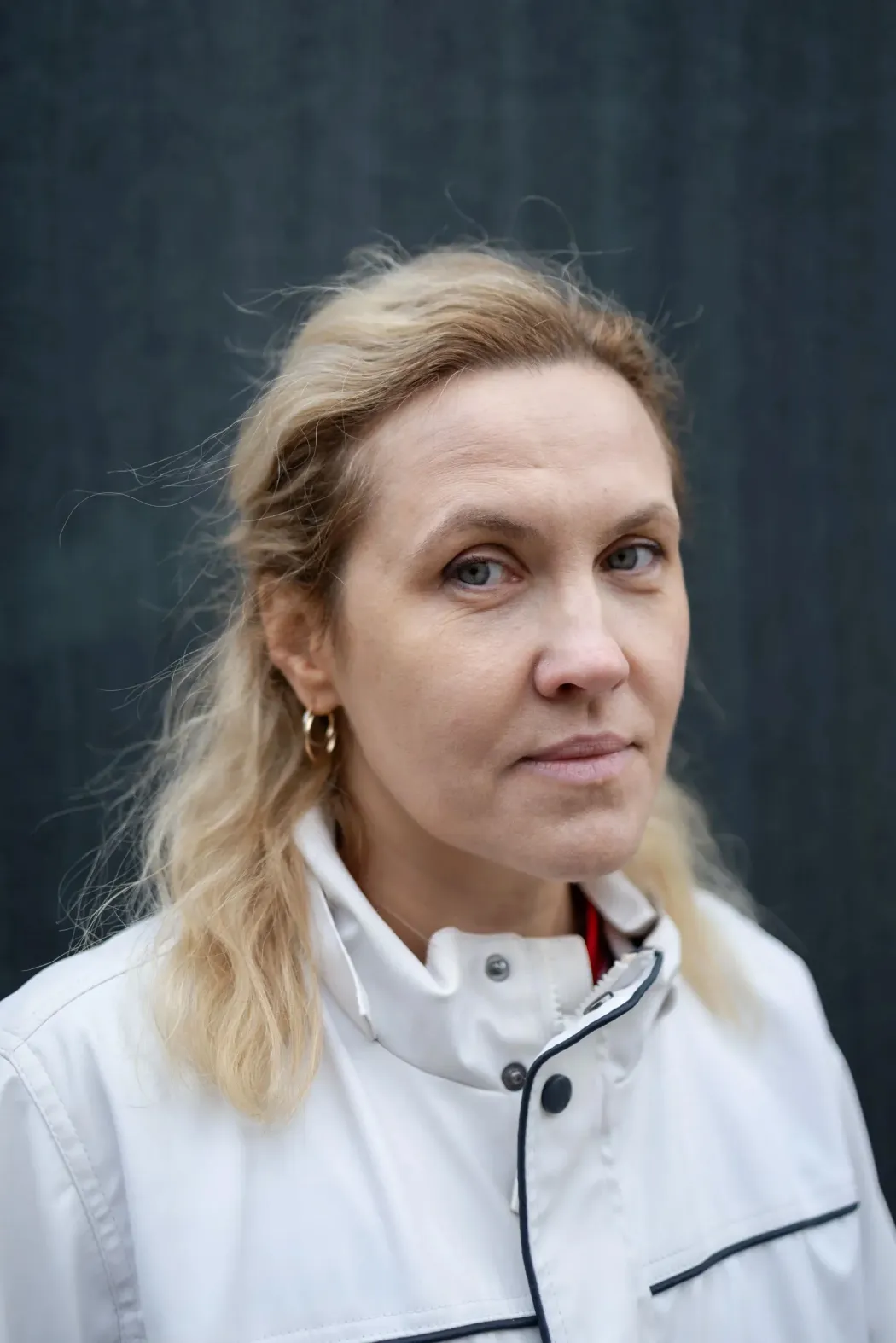
The children are first taken to a holding camp, and from there they are placed with foster parents. „The Russian state's aim in deporting these children is to raise them as Russians. In Russia, they are taught that their country has given up on them and that Ukraine doesn't exist anyway,” says Kasyanova. At the beginning of the 2022 invasion, specialists investigating the abducted children searched for them using any means available: monitoring Russian media and Russian Telegram channels, looking for any mention of Ukrainian children, photos, names or any clues that could help find them. They also received information from journalists, families involved, evacuation organizations, and there were many cases in which children who had been taken to Russia were themselves able to seek help via a dedicated helpline. Nowadays the process is more systematic, with an official register of abducted children and special search missions. But the work has been made more difficult by the fact that the Russians now share much less information about Ukrainian children.
According to Kasyanova, most of the children already have vulnerable backgrounds – growing up in foster homes or being raised by family members other than their parents – and then following the Russian invasion, they suffered further trauma: the loss of parents, grandparents, siblings or their homes. This situation is compounded by all the things they endure in Russia. Very little is known about what Ukrainian children go through in Russian foster care. According to sources at the Organisation for Security and Cooperation in Europe (OSCE), children in Russian foster care are often given new first and last names, sometimes even a different place and date of birth, which makes it very difficult for them to return home. In almost all cases, children who have been returned home report being bullied because of their Ukrainian origin, and in many cases physically abused if they refuse to speak or learn Russian or to sing the Russian national anthem. The Ukrainian Regional Center for Human Rights has also reported that children who cannot be made to comply with the foster care system in the long run are sent to special psychiatric care. The re-education process is already underway in the holding camps: at first they play with the children, promising them that they will soon be able to go home, and later they start to make them doubt whether their families will welcome them back. In some cases, the children are passed from camp to camp, so as to prevent them from developing closer relationships with each other.
Children returning home also usually need psychological and psychiatric care. Many of them are first admitted to a rehabilitation camp in western Ukraine, and later they receive group or individual therapy to help them process what has happened. In addition to psychological help, most of them need long-term support, and Kasyanova says that in addition to the logistics of bringing them home and rehabilitation, the organization also tries to help them adjust to a new environment and find new friends.
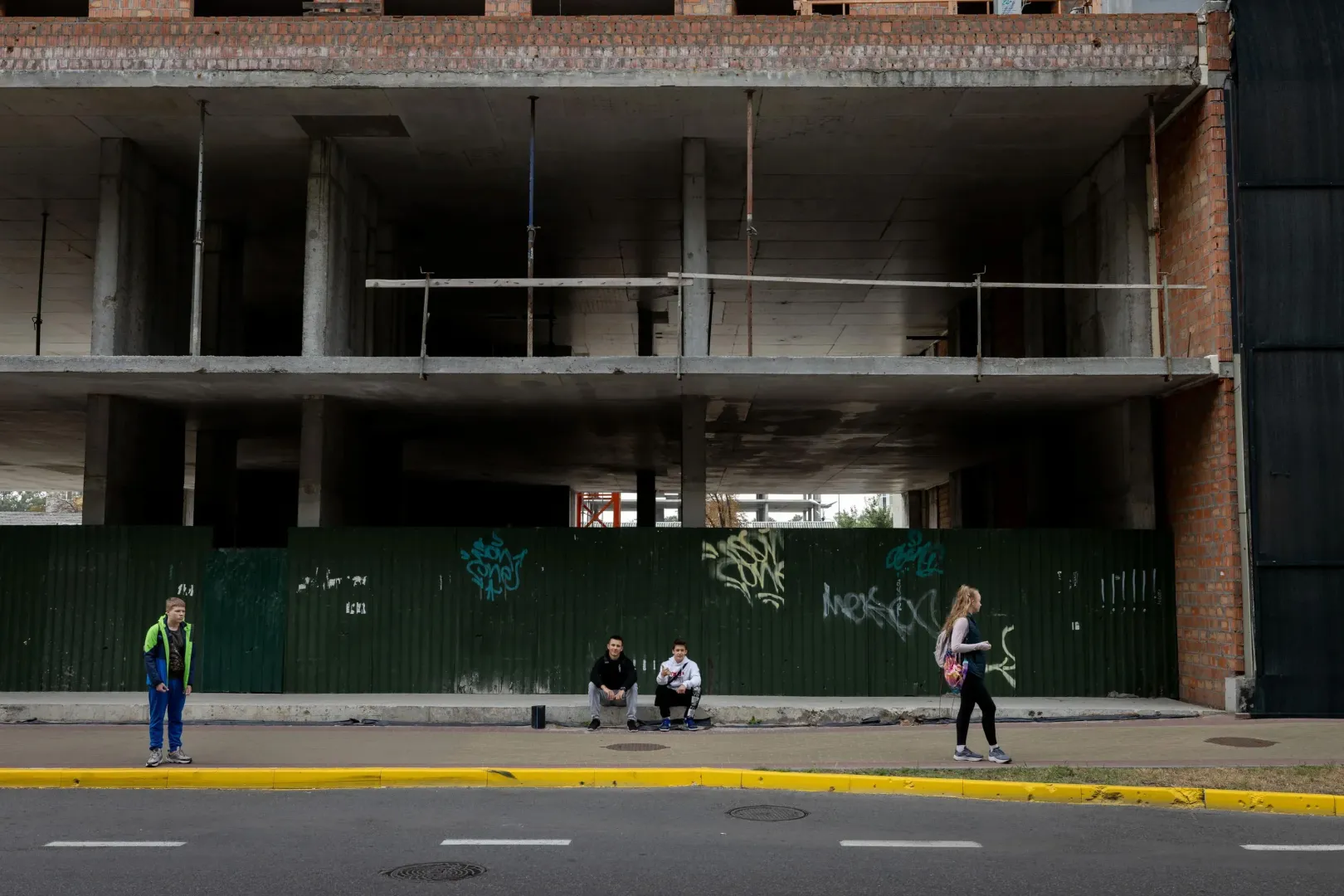
Children who have been in Russian foster care tend to be wary, often suffering from depression and aggression, nearly always withdrawn, having difficulty communicating, and may also have developed physical symptoms, stuttering and anxiety around crowds. Learning difficulties are characteristic, and Kasyanova says that it is important to accept that the first step is to stabilize the children's psychological state, and only then can they start to catch up on their studies.
Kasyanova's team is also working to alleviate stigmatization, which primarily affects parents rather than children. „Society used to generally condemn the parents of these children, and many thought that it was the parent's fault if their child was taken away, as it was their responsibility to ensure the child's safety. It is important to get the public to understand that deportation is not the fault of the parent. These children are being taken by force.”
II.
Internally displaced persons (IDPs) constitute a notably overlooked group, both in Ukraine and abroad. The International Organisation for Migration (IOM) estimates that there are now 3.3 million IDPs in Ukraine, of which around 80,000 live in Transcarpathia.
For a year and a half, Piroska Milák has been regularly visiting Transcarpathia as a volunteer for the Medspot Foundation, which provides medical assistance to people living in refugee camps. A psychiatrist and psychotherapist, she says they see signs of anxiety and depression in many people, often manifested through physical symptoms. Those living in refugee shelters may find it difficult to live with dozens of people, usually in old schools, hospitals or industrial buildings. „It is a very precarious situation. We haven't known these people for a long time, but I get the impression that everyone is functioning at a lower level than they used to, as if they've become accustomed to being helpless.”
In many cases, people are moved to new places, but there are also examples of shelters being merged. „Because of this, they are in a kind of displaced state, being shuffled from place to place, with few opportunities for work or leisure, so they mostly have nothing to do. For most of them, it's as if they have faded into this shelter existence and just live in this kind of state of confinement.” She says that the shelters are characterized by a dull, listless everyday life, where people find it hard to imagine that things can get better. But Milák says that another factor may be that those who live here are inherently more vulnerable and exposed than those who have had the opportunity to stay with friends or rent an apartment in Transcarpathia.
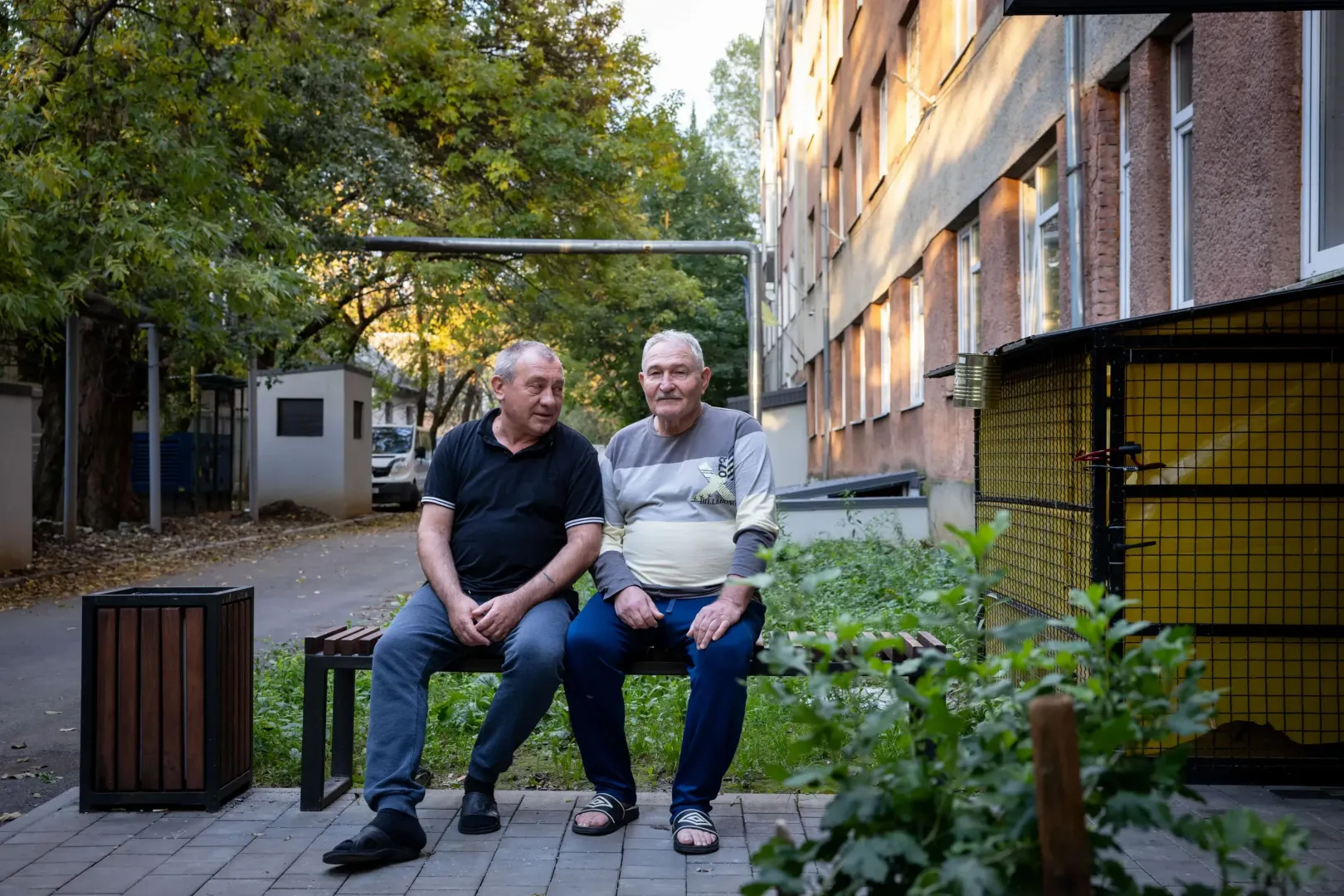
Zsanett Kepics is a clinical psychologist for children and adults and works with Ukrainian refugees in Budapest and Eger through the Cordelia Foundation. She has also been visiting refugee shelters in Transcarpathia for a long time. „People usually find it easier to talk about physical ailments, but gradually we can also get to the psychological symptoms with them,” she says of the IDPs living in Transcarpathia. Anxiety, depression and sleep disturbances are common in adults. These also occur among children, who may also develop aggressive or regressive behavior, and may show a decline in speech development or toilet training.
„An adult already has a developed sense of identity and can make sense of the situation and has more tools to process it. A child, on the other hand, can get confused, and the extent to which they can understand what is happening around them depends on their age and the capacity of their parents. The parent has a big role to play in getting the child help, but their situation is also very difficult. How do you tell a small child where their dad is, or why we only keep in touch by phone, or that he died?” Many adults choose not to talk about the war: not with relatives who stayed behind and often whose lives are in danger, because they feel they have no right to complain about safe Transcarpathia, nor with their children in order to protect them. „Many people bring up the fact that the child doesn't ask questions, so they don't tell them about the war. But a child won't ask questions if they see that their parents can't be bothered.”
According to the psychologist, worry and anxiety generally accompany everyday life, and the waiting is tempered by war-related news, anniversaries and holidays, which mark a change of rhythm. According to Kepics, the majority of people in both Ukrainian and Hungarian shelters are waiting to see when they can return home, while there is another group that has given up hope and a third group: those who have decided to stay in the West and no longer have any close contacts at home to worry about. „This group probably has the best prospects, because they can start the grieving process and try to put down roots again, which is of course never easy.”
Yuri and Vasiliy each share a room with their wives on the third floor of a refugee shelter in Uzhhorod. Vasily and his wife came from a place near Kharkiv in March 2022, while Yuri and his wife fled from Kramatorsk in Donetsk Oblast to Transcarpathia a month later. They ended up in their current shelter about a year ago and have been close ever since – in fact, they only agreed to be interviewed together. Yuri's much older sister and brother stayed at home (Kramatorsk is one of the last large cities in Donetsk that is still under Ukrainian control), his grandson lives in Dnipro, and he has not seen any of them for three years. Vasily also has relatives who stayed behind in Kharkiv. „But they are alive,” he adds quickly.
„Each person was only allowed to take one bag on the evacuation train,” says Yuri. „I had no idea what to put in it. How do you put a whole life in a suitcase? There's stuff I brought that I don't need, and a lot of stuff I left behind that I regret.” They say they are doing relatively well, they often go for walks in Uzhhorod and they don't feel lonely. But they are looking forward to being able to go home.
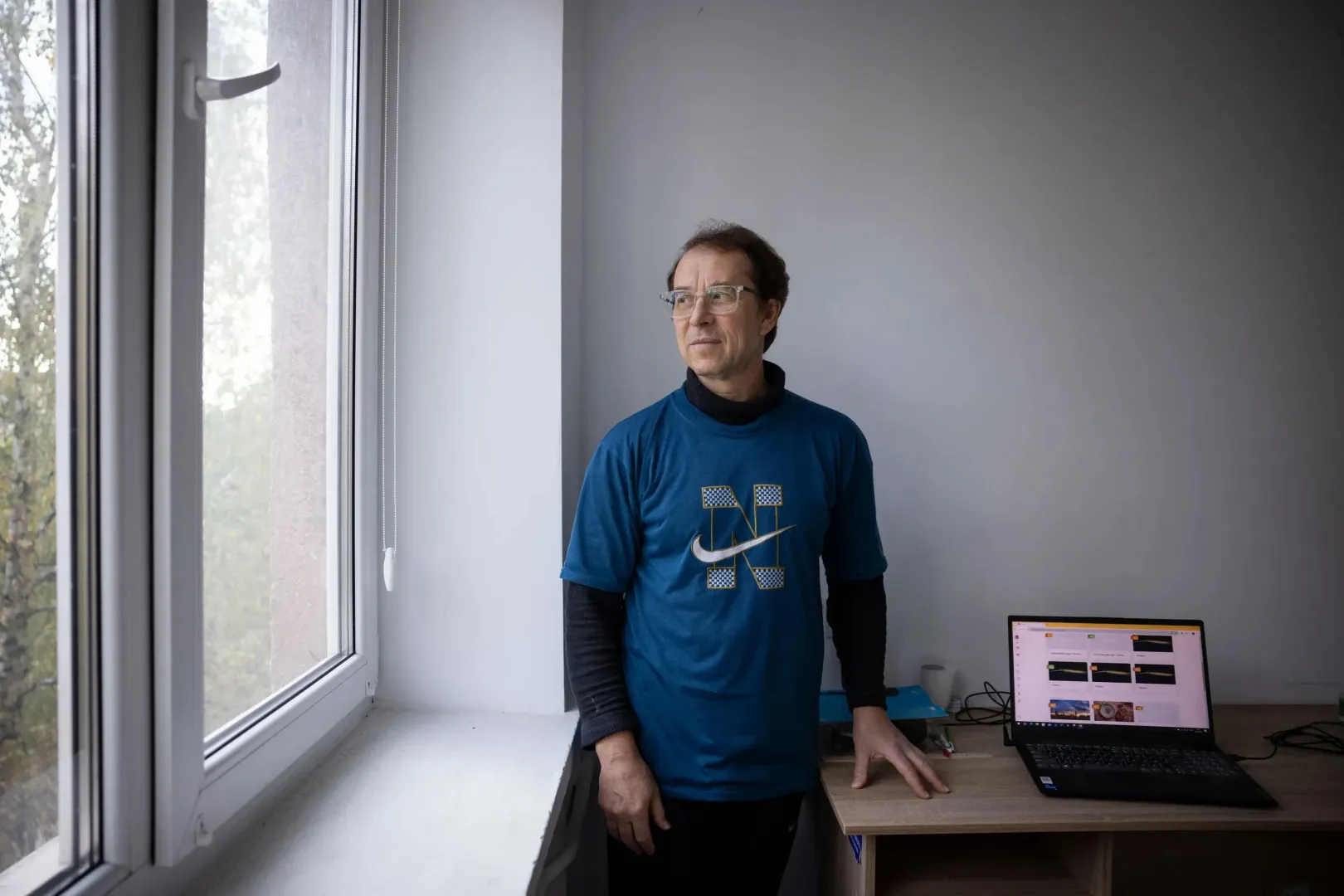
Shevchenko lives on the same floor as Yuri and Vassily, in a room along with three others. A primary school physics teacher from Severodonetsk in Luhansk, he left his bombed-out city in March 2022. He first went to a friend's house in Soledar, a one-hour drive from Bakhmut, and continued his teaching online. In May, however, the situation there was becoming increasingly dangerous, so he left with the help of volunteers for Dnipro and then Lviv. Volunteers distributing food in Lviv were waiting for the passengers at the train station, and Shevchenko says he can still remember how much he enjoyed the soup he received here. He learned from a former classmate who had fled to Uzhhorod that there were still a few places left in the sports hall for refugees. He lived in the hall for three months and has now been living in the current building for a year.
Although he came here on his own and didn't know anyone apart from his old classmate, he says he feels very well in Uzhhorod, practically like a local. He has met people here, he has grown fond of the shelter, likes the manager and has a room where he can work in peace during the day. He knows that the only safe place in Ukraine is Transcarpathia, so he is not thinking of moving to another city. „And why would I go to another country? I am Ukrainian.”
A sixth-grade homeroom teacher, he continued to teach throughout his time as a refugee. He lists at length the many places where his class has been scattered: he has students in Dnipro, Kyiv, Khmelnitsky, Lviv, Poland, Germany, Slovenia, Austria and even Finland. „I could take up teaching here locally, but I don't want to abandon my students. We only see each other online, but I don't mind. We can still count on each other.”
III.
„On March 7th, I received one of the most frightening messages you can receive from your family: my father wrote to say that the Russians had arrived in the village. A little later I saw on CNN that the Russians had shot up the church next to my grandparents' house. It took me an hour to come back to senses, it was like a nightmare. I couldn't believe what was happening. Here is my tiny hometown, which was always so insignificant, which no one ever cared about... For me, that church was the symbol of home. And there I was, watching it burn down on CNN.”
25-year-old influencer-journalist Yulia Tymoshenko graduated from New York University's Abu Dhabi campus in 2021, having previously traveled in Spain, and Argentina, and spent a year in New York during her high school years. Although her parents persuaded her to stay abroad, after graduation she moved to Kyiv and started working for a consulting firm. On the side, she was producing Instagram and TikTok content for young Ukrainians about how to get into universities abroad. In December 2021, as tensions between Russia and Ukraine increased, she started producing a different kind of content: she discussed the misconceptions circulating in the Western media about Ukraine. In late January, one of her posts had reached over 100,000 shares, and she says it was even picked up by local embassies. By the time the war broke out a month later, she was already regularly producing educational content about Russian-Ukrainian relations.
On February 25, a day after Russia invaded Ukraine, she fled with her mother and a friend to Ternopil, nearly 400 km west of Kyiv, and later to Lviv, where Yulia stayed for three months. Her father stayed with her grandparents in Zarovichi, Julia's home village, near Kyiv. The Russians reached the village on March 7, and it remained in Russian hands for nearly three weeks. „It was very tough, even more so for them, of course,” she says of what it was like to follow what was happening to her family and her village from afar. But it was only much later, after I found out what had happened in Bucha, that I became aware of what it could have been like."
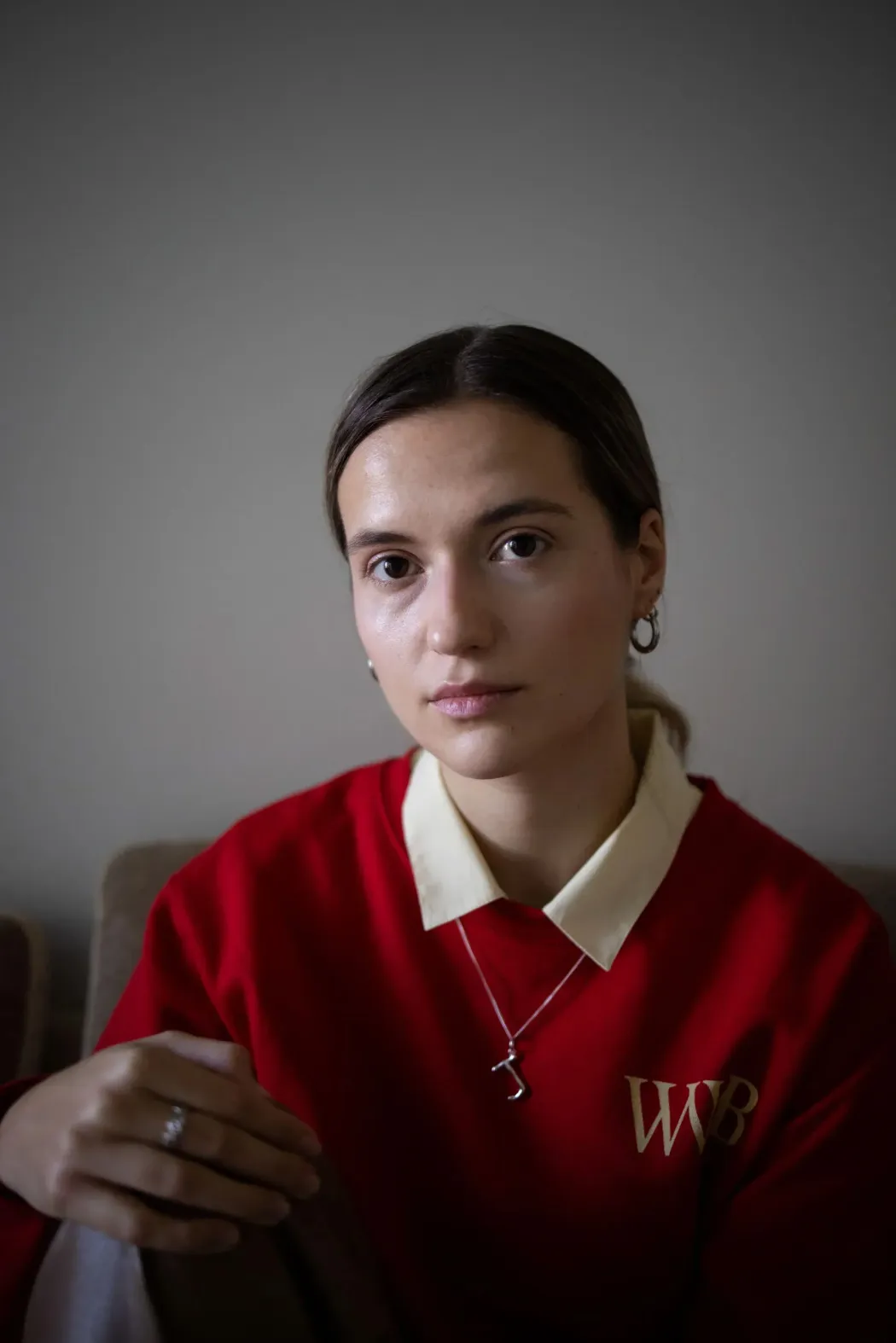
Her family hid in a cellar, with no gas or electricity, and from time to time her father and a few men would sneak out to try to restock supplies. „The Russians abducted the doctor from the neighboring village because they needed a doctor. Meanwhile they were asking where 'the pretty girls' were and slaughtering people at random: after the Russians left, the locals found several people in cellars with broken ribs, shot through the head... But the same thing was happening everywhere else.” Through it all, Yulia fretted about what might have happened to her family. Her father began to lose hope during the second week, drinking heavily and repeatedly texting Julia to run away to Canada to stay with friends. Her grandparents had already said they were not going anywhere, even if their home was reduced to rubble. „I remember them asking: what's the point of living if your home is being destroyed?”
Even those who have largely resumed their former lives and are relatively safe are not immune to the psychological effects of war. According to Svitlana Kika, a psychotherapist at the recently opened clinic of the Ukrainian Catholic University (UCU) in Lviv, even in the relatively safe western part of Ukraine, most people are under enormous stress. „They are exhausted, they are anxious, they have less and less mental resources to cope with everyday life, and they feel they have no control over their lives because of the war. It takes tremendous work to identify areas where you still feel a sense of control,” she says. The Russians play on this with psychological warfare, such as attacking power grids. „It's very stressful to be without power for hours or days: it's dark, it's cold, you're scared but you can't do anything about it – you don't feel well physically or mentally. It makes it difficult to stay productive.” The psychotherapist says that Ukrainians are more aware of mental health than before – even men are reaching out more and more for help – but the decision to seek professional help depends largely on one's financial situation, social status and age.
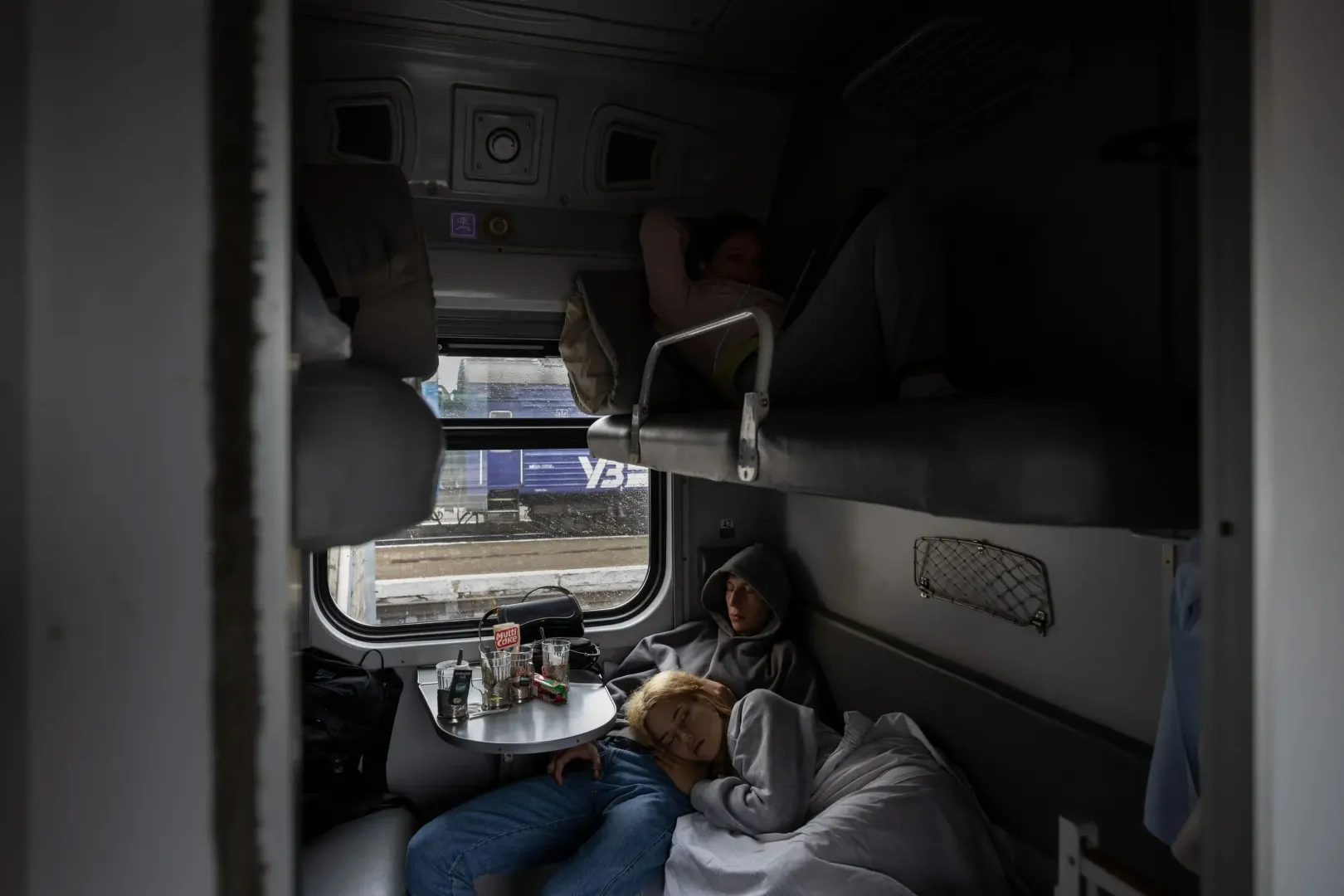
Many people turn to her with relationship or family problems. The absence of men puts women under enormous pressure to cope with everyday life on their own, with the constant anxiety of what might be happening on the front lines. The general feeling of exhaustion has led to more people seeking help from experts for divorce than before, and according to Kika, many feel they no longer have the energy to work on their conflicts and relationships. And of course many are affected by the frustration and depression that comes from this uncertainty. „During the first year we just wanted to see the following day, then the following week. But even now, it's hard to plan, let alone to have dreams, because we have to live our lives according to multiple possible scenarios at the same time, constantly being on the alert in case we have to change our plans.”
For the first year and a half, many had a hard time dealing with the guilt about those on the front lines. According to Kika, masses of people experienced remorse, regardless of their living situation. Guilt was felt by those who had left the country, those who had fled to safer parts, those who had left the eastern parts before February 24, those who had evacuated their families, those who had not been conscripted – however, as we saw in the previous part of our series, some people are still haunted by guilt even on the front lines. The psychotherapist says that many soldiers insist that civilians should live their lives, go to cafés, watch films, and play with their children. „Our soldiers are on the front line precisely to ensure that all this is possible. It's important to be able to take care of yourself in the real world, to have a daily routine and just do what you can. You can still reflect on what more you can do for others, on how you can give a little more the next day. But sometimes it's perfectly okay to just have the energy to get through the day and collapse into bed at night.”
After the region around Kyiv was liberated, Yulia Tymoshenko moved back home from Lviv. Since then she has continued to produce content about the war. Lately, she has also been posting about mental health and running a show on the media platform Ukrainer. She says she can feel herself getting used to the war. „When the missiles come, it's still scary, but the drones are now just more of a nuisance. If it's serious, at most I go into the bathroom because it doesn't have any windows. I know that this attitude is not normal, but we are faced with death all the time. The country is burdened with so much grief that it's the only way we can do things. The other day I was in a taxi going somewhere here in Kyiv, and the taxi driver from Mariupol was talking about how he buried his neighbor at the beginning of the Russian invasion. For him, it's a standard topic of conversation in the morning. Everyone is trying to separate themselves from what is happening.”
She feels that younger people have come to recognize the importance of looking after their mental health during the war, while older people have maintained a conservative attitude despite the hardships. „My grandmother sometimes remarks that she doesn't understand our generation and our depression. According to her, depression disappears immediately if you go out to work in the fields,” she says with a laugh.
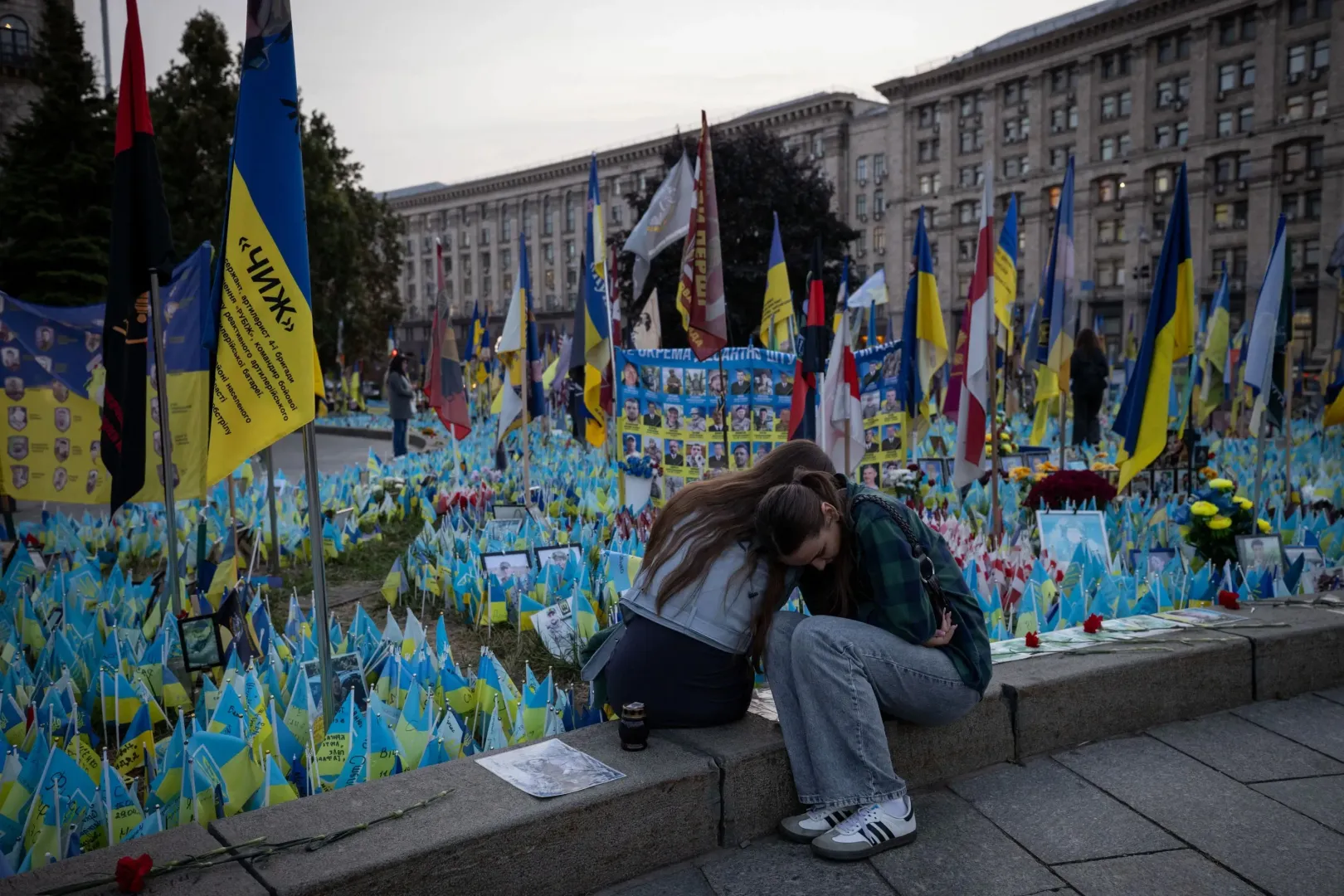
During the second week of the Russian invasion, Julia went back to the therapist she had been going to when she was at university. Apart from that, she tries to exercise, occasionally going for a massage because her muscles are always tense from the constant alertness, and meanwhile she does her best not to retreat into her work as she did at first. She is also lucky in that she has the opportunity to travel, but fear sometimes follows her abroad. „I was traveling in Greece in August and one morning I was reading about the massive early morning Russian attack on my phone when I heard the sound of F-16s training nearby. I was terribly frightened because in my head I was at home in Ukraine. I had to go out on the balcony to see where I was with my own eyes. To reassure myself that I was safe.”
She's well aware that the vast majority of people can't even afford to travel abroad or to go to therapy – especially the latter considering how difficult it is to find a good specialist in the country. „Since 2022 we've had a new saying: we no longer strive for work-life balance – we strive for war-life balance.”
This article was produced with the financial support of the European Union. Telex is solely responsible for its content and under no circumstances should it be taken to reflect the position of the European Union.